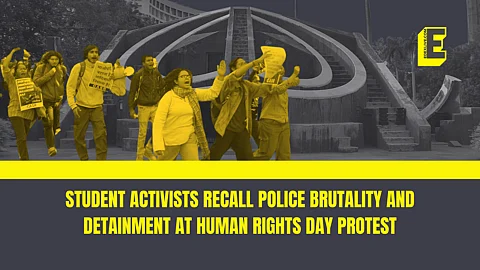

Student activists from various organisations in New Delhi were allegedly subjected to police brutality and detained at various police stations by the Delhi Police on Sunday, December 10, which also happened to be the 76th Human Rights Day.
These students are members of organisations like the All India Students’ Association (AISA), Students’ Federation of India (SFI), Bhagat Singh Chatra Ekta Manch (BSCEM), Dalit Student Union (DSU), Fraternity Movement and more.
These student groups joined other progressive groups like the Progressive Lawyers’ Association, Bhim Army, Mazdoor Adhikar Sangathan, United Against Hate, and more under the aegis of the Campaign Against State Repression (CASR) for a protest gathering at Jantar Mantar, in condemnation of various human rights violations by the Indian Government.
Violent detainment by Delhi Police
Despite receiving permission from Delhi Police to hold the rally, the CASR was denied permission at the last minute, say student activists who participated in the rally on Sunday.
On Saturday, December 9, the CASR shared a notice from the office of the Deputy Commissioner of Delhi Police, informing them that the rally cannot take place, and requesting them to “cooperate” with the Delhi Police.
The organisers decided to hold the protest gathering, despite the permission being withdrawn.
However, student activists soon found themselves being not only violently detained, but also facing aggressive police brutality.
Narrating the ordeal that the protestors went through, Baadal, a member of the BSCEM narrates, “As we were rallying towards Jantar Mantar, we were met with barricades and police personnel, who started detaining us.” He says that the police officers were also joined by paramilitary personnel and that the crackdown against the rally was unprecedentedly violent.
“Women and transgender activists faced targeted violence. There weren’t any female constables, and the male constables manhandled women protestors. Trans persons in the rally were met with both physical and verbal abuse from the police and paramilitary personnel,” Baadal says, alleging that slurs like “hijra” were used against them.
Detailing the excess of violence displayed against the protestors, Baadal says that they were beaten with lathis, dragged by the hair, and hit on their private parts for resisting detainment. In addition, a paramilitary jawan even threatened protestors with loaded guns and beat them with the backs of their guns, he claims.
“Police brutality has become a natural response to protests over the last few years, but we have never seen such brutality before,” Baadal adds, saying that the policemen were also not wearing badges.
Videos of students being detained, shared by CASR show protestors being forcefully dragged into police vans by police and paramilitary personnel.
Eventually, the protesting students were taken to two different police stations, that is, Najafgarh and Dwarka.
However, after a few hours, one of the protestors in the rally, Gaurav Singh, who was also a member of BSCEM, was noticed to be missing.
“While we were divided and taken to different police stations, Gaurav was isolated from all of us,” says Baadal, adding that about 10 police and paramilitary personnel were seen beating him brutally with lathis and the backs of their guns.
“When we tried calling him, the call was not answered by him and the person who answered the call told us that they found the phone on the street. We immediately realised that his phone was confiscated from him, as his phone remained in his bag when the police took him,” Badal says.
Following this, the protestors started to raise SOS calls to the press, other student groups, and for legal assistance.
Further, the police were also not honest about his whereabouts and told the protestors that he was being held at Jaffarpur Police Station. “The police would not disclose where Gaurav was being held. They demanded that we tell them our names, and even threatened to call the parents of a few students,” Baadal claims.
After a Habeas Corpus case, it was finally revealed that Gaurav was being held at the Mandir Marg Police Station. Then, he was eventually released at around 9 pm on Sunday night.
Continued harassment
However, for the activists, the ordeal did not end there.
Even as the activists and students dispersed from the police station, they were followed by policemen, says Anjali Sharma, Secretary of AISA, Delhi University. “We had policemen follow us to where we stopped to eat, and even to the metro station,” they add. According to a few news reports, most student activists were surveilled by police personnel.
In addition, Baadal says that the phones of two female student activists were confiscated by the police and not returned to them.
“The police refused to return the phones and continued to harass them further. It wasn’t until 8 pm yesterday (December 11) that they finally got their phones back,” he says, alleging that the police only kept their phones in their possession to find information on other student activists.
The Delhi Police have been increasingly targeting and restricting the activity of progressive groups, alleges Anjali.
They further allege, “ABVP was also organising an event at Jantar Mantar on Sunday, and this is the reason Delhi Police withdrew its permission of CASR. Whenever ABVP holds a rally, the Delhi Police brings the entire traffic to a standstill so that the rally happens smoothly. Whenever a progressive group tries to conduct an event, they are not only denied permission but also attacked by the police.”
